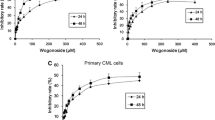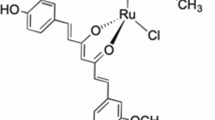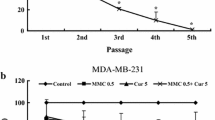Abstract
Aberrant expression of forkhead box protein M1 (FoxM1) contributes to carcinogenesis in human cancers, including acute myeloid leukemia (AML), suggesting that the discovery of specific agents targeting FoxM1 would be extremely valuable for the treatment of AML. Curcumin, a naturally occurring phenolic compound, is suggested to possess anti-leukemic activity; however, the underlying mechanism has not been well elucidated. In this study, we found that curcumin inhibited cell survival accompanied by induction of G2/M cell cycle arrest and apoptosis in HL60, Kasumi, NB4, and KG1 cells. This was associated with concomitant attenuation of FoxM1 and its downstream genes, such as cyclin B1, cyclin-dependent kinase (CDK) 2, S-phase kinase-associated protein 2, Cdc25B, survivin, Bcl-2, matrix metalloproteinase (MMP)-2, MMP-9, and vascular endothelial growth factor (VEGF), as well as the reduction of the angiogenic effect of AML cells. We also found that specific downregulation of FoxM1 by siRNA prior to curcumin treatment resulted in enhanced cell survival inhibition and induction of apoptosis. Accordingly, FoxM1 siRNA increased the susceptibility of AML cells to doxorubicin-induced apoptosis. More importantly, curcumin suppressed FoxM1 expression, selectively inhibited cell survival as well as the combination of curcumin and doxorubicin exhibited a more inhibitory effect in primary CD34+ AML cells, while showing limited lethality in normal CD34+ hematopoietic progenitors. These results identify a novel role for FoxM1 in mediating the biological effects of curcumin in human AML cells. Our data provide the first evidence that curcumin together with chemotherapy or FoxM1 targeting agents may be effective strategies for the treatment of AML.
Key message
-
Curcumin inhibited AML cell survival and angiogenesis and induced chemosensitivity.
-
Aberrant expression of FoxM1 induces AML cell survival and chemoresistance.
-
Inactivation of FoxM1 contributes to curcumin-induced anti-leukemic effects.
-
Curcumin together with FoxM1 targeting agents may be effective for AML therapy.






Similar content being viewed by others
References
Feldman EJ, Gergis U (2012) Management of refractory acute myeloid leukemia: re-induction therapy or straight to transplantation? Curr Hematol Malig Rep 7:74–77
Ji M, Li J, Yu H, Ma D, Ye J, Sun X, Ji C (2009) Simultaneous targeting of MCL1 and ABCB1 as a novel strategy to overcome drug resistance in human leukaemia. Br J Haematol 145:648–656
Zhang J, Ye J, Ma D, Liu N, Wu H, Yu S, Sun X, Tse W, Ji C (2013) Cross-talk between leukemic and endothelial cells promotes angiogenesis by VEGF activation of the Notch/Dll4 pathway. Carcinogenesis 34:667–677
Zhang J, Ma D, Ye J, Zang S, Lu F, Yang M, Qu X, Sun X, Ji C (2012) Prognostic impact of delta-like ligand 4 and Notch1 in acute myeloid leukemia. Oncol Rep 28:1503–1511
Nakamura S, Hirano I, Okinaka K, Takemura T, Yokota D, Ono T, Shigeno K, Shibata K, Fujisawa S, Ohnishi K (2010) The FOXM1 transcriptional factor promotes the proliferation of leukemia cells through modulation of cell cycle progression in acute myeloid leukemia. Carcinogenesis 31:2012–2021
Wang IC, Chen YJ, Hughes D, Petrovic V, Major ML, Park HJ, Tan Y, Ackerson T, Costa RH (2005) Forkhead box M1 regulates the transcriptional network of genes essential for mitotic progression and genes encoding the SCF (Skp2-Cks1) ubiquitin ligase. Mol Cell Biol 25:10875–10894
Ha SY, Lee CH, Chang HK, Chang S, Kwon KY, Lee EH, Roh MS, Seo B (2012) Differential expression of forkhead box M1 and its downstream cyclin-dependent kinase inhibitors p27(kip1) and p21(waf1/cip1) in the diagnosis of pulmonary neuroendocrine tumours. Histopathology 60:731–739
Ustiyan V, Wang IC, Ren X, Zhang Y, Snyder J, Xu Y, Wert SE, Lessard JL, Kalin TV, Kalinichenko VV (2009) Forkhead box M1 transcriptional factor is required for smooth muscle cells during embryonic development of blood vessels and esophagus. Dev Biol 336:266–279
Dai B, Kang SH, Gong W, Liu M, Aldape KD, Sawaya R, Huang S (2007) Aberrant FoxM1B expression increases matrix metalloproteinase-2 transcription and enhances the invasion of glioma cells. Oncogene 26:6212–6219
Ahmad A, Wang Z, Kong D, Ali S, Li Y, Banerjee S, Ali R, Sarkar FH (2010) FoxM1 down-regulation leads to inhibition of proliferation, migration and invasion of breast cancer cells through the modulation of extra-cellular matrix degrading factors. Breast Cancer Res Treat 122:337–346
Wang Z, Banerjee S, Kong D, Li Y, Sarkar FH (2007) Down-regulation of Forkhead Box M1 transcription factor leads to the inhibition of invasion and angiogenesis of pancreatic cancer cells. Cancer Res 67:8293–8300
Zhang X, Zeng J, Zhou M, Li B, Zhang Y, Huang T, Wang L, Jia J, Chen C (2012) The tumor suppressive role of miRNA-370 by targeting FoxM1 in acute myeloid leukemia. Mol Cancer 11:56
Rao J, Xu DR, Zheng FM, Long ZJ, Huang SS, Wu X, Zhou WH, Huang RW, Liu Q (2011) Curcumin reduces expression of Bcl-2, leading to apoptosis in daunorubicin-insensitive CD34+ acute myeloid leukemia cell lines and primary sorted CD34+ acute myeloid leukemia cells. J Transl Med 9:71
Li Y, Zhang J, Ma D, Zhang L, Si M, Yin H, Li J (2012) Curcumin inhibits proliferation and invasion of osteosarcoma cells through inactivation of Notch-1 signaling. FEBS J 279:2247–2259
Kunnumakkara AB, Anand P, Aggarwal BB (2008) Curcumin inhibits proliferation, invasion, angiogenesis and metastasis of different cancers through interaction with multiple cell signaling proteins. Cancer Lett 269:199–225
Hartojo W, Silvers AL, Thomas DG, Seder CW, Lin L, Rao H, Wang Z, Greenson JK, Giordano TJ, Orringer MB et al (2010) Curcumin promotes apoptosis, increases chemosensitivity, and inhibits nuclear factor kappaB in esophageal adenocarcinoma. Transl Oncol 3:99–108
Goel A, Aggarwal BB (2010) Curcumin, the golden spice from Indian saffron, is a chemosensitizer and radiosensitizer for tumors and chemoprotector and radioprotector for normal organs. Nutr Cancer 62:919–930
Sharma AV, Ganguly K, Paul S, Maulik N, Swarnakar S (2012) Curcumin heals indomethacin-induced gastric ulceration by stimulation of angiogenesis and restitution of collagen fibers via VEGF and MMP-2 mediated signaling. Antioxid Redox Signal 16:351–362
Yang CL, Liu YY, Ma YG, Xue YX, Liu DG, Ren Y, Liu XB, Li Y, Li Z (2012) Curcumin blocks small cell lung cancer cells migration, invasion, angiogenesis, cell cycle and neoplasia through Janus kinase-STAT3 signalling pathway. PLoS One 7:e37960
Zhang Y, Zhang N, Dai B, Liu M, Sawaya R, Xie K, Huang S (2008) FoxM1B transcriptionally regulates vascular endothelial growth factor expression and promotes the angiogenesis and growth of glioma cells. Cancer Res 68:8733–8742
Li Q, Zhang N, Jia Z, Le X, Dai B, Wei D, Huang S, Tan D, Xie K (2009) Critical role and regulation of transcription factor FoxM1 in human gastric cancer angiogenesis and progression. Cancer Res 69:3501–3509
Li Y, Zhang J, Zhang L, Si M, Yin H, Li J (2013) Diallyl trisulfide inhibits proliferation, invasion and angiogenesis of osteosarcoma cells by switching on suppressor microRNAs and inactivating of Notch-1 signaling. Carcinogenesis 34:1601–1610
Alvarez-Fernandez M, Medema RH (2013) Novel functions of FoxM1: from molecular mechanisms to cancer therapy. Front Oncol 3:30
Wierstra I (2013) FOXM1 (Forkhead box M1) in tumorigenesis: overexpression in human cancer, implication in tumorigenesis, oncogenic functions, tumor-suppressive properties, and target of anticancer therapy. Adv Cancer Res 119:191–419
Gartel AL (2012) The oncogenic transcription factor FOXM1 and anticancer therapy. Cell Cycle 11:3341–3342
Wang Z, Ahmad A, Banerjee S, Azmi A, Kong D, Li Y, Sarkar FH (2010) FoxM1 is a novel target of a natural agent in pancreatic cancer. Pharm Res 27:1159–1168
Ahmad A, Ali S, Wang Z, Ali AS, Sethi S, Sakr WA, Raz A, Rahman KM (2011) 3,3′-Diindolylmethane enhances taxotere-induced growth inhibition of breast cancer cells through downregulation of FoxM1. Int J Cancer 129:1781–1791
Wan R, Mo Y, Zhang X, Chien S, Tollerud DJ, Zhang Q (2008) Matrix metalloproteinase-2 and -9 are induced differently by metal nanoparticles in human monocytes: The role of oxidative stress and protein tyrosine kinase activation. Toxicol Appl Pharmacol 233:276–285
Fu Z, Malureanu L, Huang J, Wang W, Li H, van Deursen JM, Tindall DJ, Chen J (2008) Plk1-dependent phosphorylation of FoxM1 regulates a transcriptional programme required for mitotic progression. Nat Cell Biol 10:1076–1082
Carter BZ, Qiu Y, Huang X, Diao L, Zhang N, Coombes KR, Mak DH, Konopleva M, Cortes J, Kantarjian HM et al (2012) Survivin is highly expressed in CD34(+)38(−) leukemic stem/progenitor cells and predicts poor clinical outcomes in AML. Blood 120:173–180
Zhao X, Ogunwobi OO, Liu C (2011) Survivin inhibition is critical for Bcl-2 inhibitor-induced apoptosis in hepatocellular carcinoma cells. PLoS One 6:e21980
Park J, Ayyappan V, Bae EK, Lee C, Kim BS, Kim BK, Lee YY, Ahn KS, Yoon SS (2008) Curcumin in combination with bortezomib synergistically induced apoptosis in human multiple myeloma U266 cells. Mol Oncol 2:317–326
Duarte VM, Han E, Veena MS, Salvado A, Suh JD, Liang LJ, Faull KF, Srivatsan ES, Wang MB (2010) Curcumin enhances the effect of cisplatin in suppression of head and neck squamous cell carcinoma via inhibition of IKKbeta protein of the NFkappaB pathway. Mol Cancer Ther 9:2665–2675
Shehzad A, Wahid F, Lee YS (2010) Curcumin in cancer chemoprevention: molecular targets, pharmacokinetics, bioavailability, and clinical trials. Arch Pharm 343:489–499
Prasad S, Tyagi AK, Aggarwal BB (2014) Recent developments in delivery, bioavailability, absorption and metabolism of curcumin: the golden pigment from golden spice. Can Res Treat Off J Korean Cancer Assoc 46:2–18
Acknowledgments
This work was supported by the National Nature Science Foundation of China (81370662, 81070422, 30871088, 81070407) and the Specialized Research Fund for the Doctoral Program of Higher Education (SRFDP, Ministry of Education) (20100131110060).
Conflict of interest
All the authors declared no competing interests.
Author information
Authors and Affiliations
Corresponding author
Additional information
Jing-ru Zhang and Fei Lu contributed equally to this work.
Electronic supplementary material
Below is the link to the electronic supplementary material.
ESM 1
(PDF 935 kb)
Rights and permissions
About this article
Cite this article
Zhang, Jr., Lu, F., Lu, T. et al. Inactivation of FoxM1 transcription factor contributes to curcumin-induced inhibition of survival, angiogenesis, and chemosensitivity in acute myeloid leukemia cells. J Mol Med 92, 1319–1330 (2014). https://doi.org/10.1007/s00109-014-1198-2
Received:
Revised:
Accepted:
Published:
Issue Date:
DOI: https://doi.org/10.1007/s00109-014-1198-2




